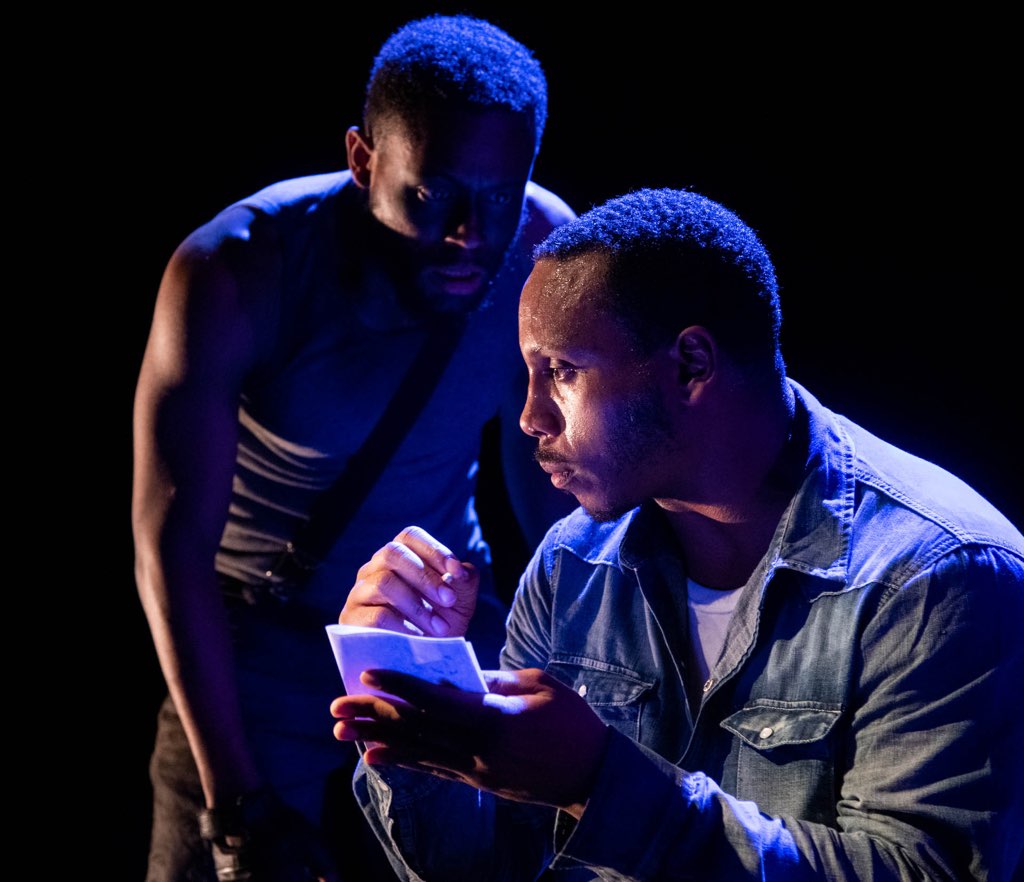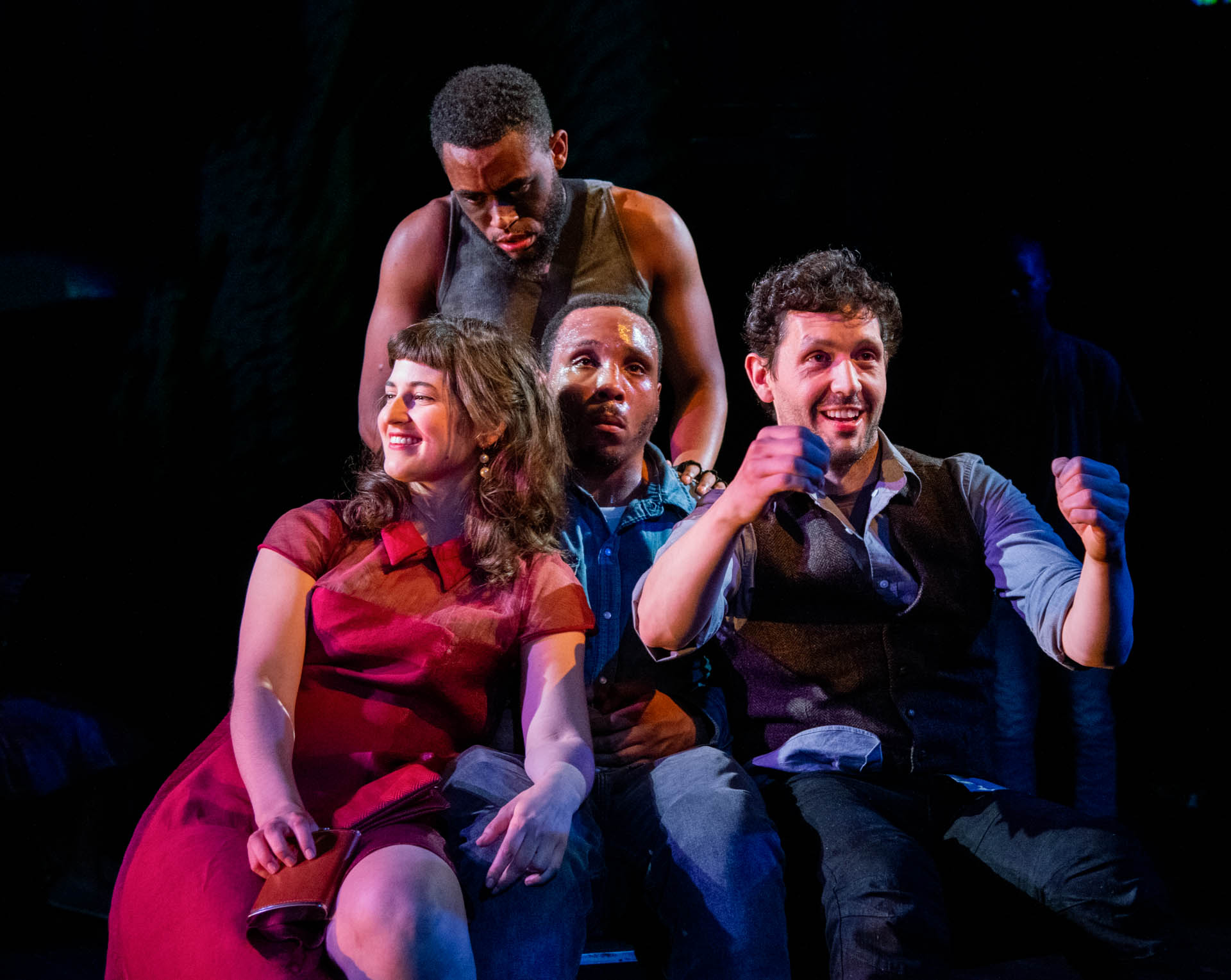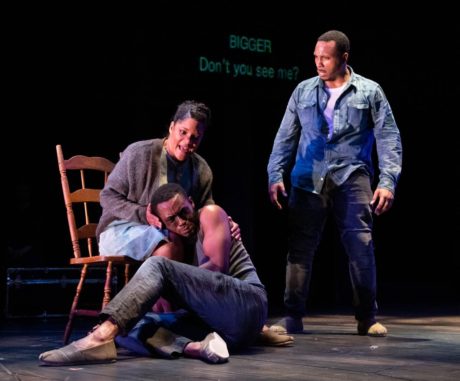We usually think of a rat as a detestable lowlife animal that we dread. It slinks in dark corners of the floor, hiding itself from being seen. It nervously darts and runs when spotted and can fit itself into a hole as small as a dime to survive. It chews its way to freedom. In Nambi E. Kelley’s searing adaptation of Richard Wright’s 1940 novel, Native Son, she uses the metaphor of a Black Rat to peer into the souls of Black folks through the character of Bigger Thomas, a young Black man in search of freedom. But a rat will kill you. Corner a rat and it will rear back, hiss and go for the jugular.

Richard Wright’s intention for Native Son was to be America’s guide for confronting the dangers of racism. The Mosaic Theater Company of DC’s production of Native Son, under the direction of award-winning director, Psalmayene 24, goes further and reveals how Black folks see themselves through the eyes of a 20-year-old Black man and his alter ego, the character of the Black Rat.
The play is a boiling cauldron of blistering raw emotion and free-form flights of fancy that open the sealed doors to the taut, jagged mind of a Black man and in doing so blast wide open the sealed windows of a nation that refuses to come to terms with its racist past. It exposes the warning signs that lurk therein and has a clear message for the divisions we are witnessing today.
Playwright/actor Nambi E. Kelley does the gargantuan job of brilliantly condensing a 400-page novel into a 90-minute whirlwind of interlocking fast-forwards and rewinds about Bigger Thomas, a Black man guilty of committing two murders. One is a rich, white girl that he is also falsely accused of raping. Her murder was an accident but the situation that Bigger finds himself in is a combination of poor life choices and circumstances beyond his control.
Native Son begs the question of whether Bigger Thomas is responsible for his own downfall. Or are all of the people and the constraints of a society that would deny his very existence as guilty as he is?
In the play’s haunting opening moments all one can hear is the hyperventilated breath of the full ensemble who stand in unison with Bigger caught in a powerful vortex as they breathe in counterpoint to Bigger’s need to breathe. They will surround him again and again in the production as spectator and co-conspirator struggling to catch one’s breath in the search for justice.
It’s the 1930s, a time of virulent, open racism when Black folks’ everyday lives were lived in abject degradation and poverty. W.E.B. DuBois describes a dual focus on how Blacks are seen by a larger society vs. how they see themselves as a “double consciousness” that always exists in the minds of Black folks. In Nambi E. Kelley’s adaptation, she tackles DuBois’ dichotomy and takes the liberty of condensing Wright’s seminal work into a fleeting moment in the psyche of the protagonist by focusing solely on how he sees himself.
This is revolutionary. In doing so, Native Son goads us into seeing the dangers inherent in perpetuating racism by refusing to see what is staring us in the face as a society.

Clayton Pelham Jr.’s Bigger Thomas is larger than life even though he is seen by society as just another invisible man. Bigger lives with his thumb on the trigger ready to release pent up fear and anger as an antidote to what ails him. Pelham’s Bigger isn’t the docile, dumb cluck that White folks think he is and his attempts to act deferentially around them come off like veiled mockery knowing that aggressive, brute power lies within.
As the Black Rat, Vaughn Ryan Midder is a menacing presence that lurks within Bigger’s innermost thoughts fancying dreams of a better future that depends upon survival at all costs.
Lolita Marie as Hannah, Bigger’s mother, Renee Elizabeth Wilson as Vera, his sister who doubles as Bigger’s girlfriend Bessie, and Tendo Nsubuga play the roles of Bigger’s closest connections. The actors portray their characters in line with the prevailing sentiments of the day about Blacks’ dependent, subservient place in society. Bigger refuses to fully embrace their damaged view of themselves and their over-reliance on religion.

The Red Scare and the rise of the Communist movement influence the mindsets of Mary Dalton, the murdered White girl and rebellious wannabe Communist, played with a ditzy sexuality by Madeline Joey Rose and Drew Kopas as Jan Erlone, Mary’s passionate, Party boyfriend, who would be implicated in her murder.
Melissa Flaim is Mary’s mother, Mrs. Dalton, a blind woman. She’s a haughty, rich benefactor who sympathizes with Black causes by heftily supporting the NAACP while being landlord to the roach and rat-infested tenement where the Thomas family lives. She hires Bigger to be a chauffeur for the Daltons. Hers is a different kind of dual consciousness that she shares with the character of Britten, played with gravelly-voiced bigotry by Stephen F. Schmidt, a private investigator hired by the Daltons to find Mary’s killer. Britten is in-your-face with overt denigration of Bigger and calls a spade a spade but in more graphic terms.
Set designer Ethan Sinnott’s cold, lifeless building façade captures the silent grayness of tenement living. He uses a minimum of props that center upon two large, imposing trunks that symbolize the secrets held in Bigger Thomas’ turbulent life.
Richard Wright’s Native Son as adapted by Nambi E. Kelley will run in repertory with Les Deux Noirs: Notes on Notes of a Native Son, inspired by James Baldwin’s blistering critique of Wright’s controversial work, written by Psalmayene 24 and directed by Raymond O. Caldwell, new artistic director of the Anacostia-based Theatre Alliance.
Native Son is an explosive and shattering glimpse into the African-American experience that falls to the depths of despair only to rise up in fitful flights of hopeful defiance. It radically redefines freedom on its own terms.
Running Time: 80 minutes with no intermission.
[Read John Stoltenberg’s Magic Time! column about Native Son.]
Native Son plays through April 28, 2019, in rep with Les Deux Noirs: Notes on Notes of a Native Son from April 7 through April 27, 2019, at Mosaic Theater Company of DC performing at Atlas Performing Arts Center – 1333 H Street NE, in Washington, D.C. For tickets, call the box office at (202) 399-7993 ext. 2, or purchase them online.





Thanks for capturing the timeless thoughts of W. E. B. DuBois on how the Souls of Black Folks have always struggled with ‘double consciousness’! Something to keep in mind when the egos of Wright and Baldwin clash in Les Deux Noirs: Notes of a Native Son!